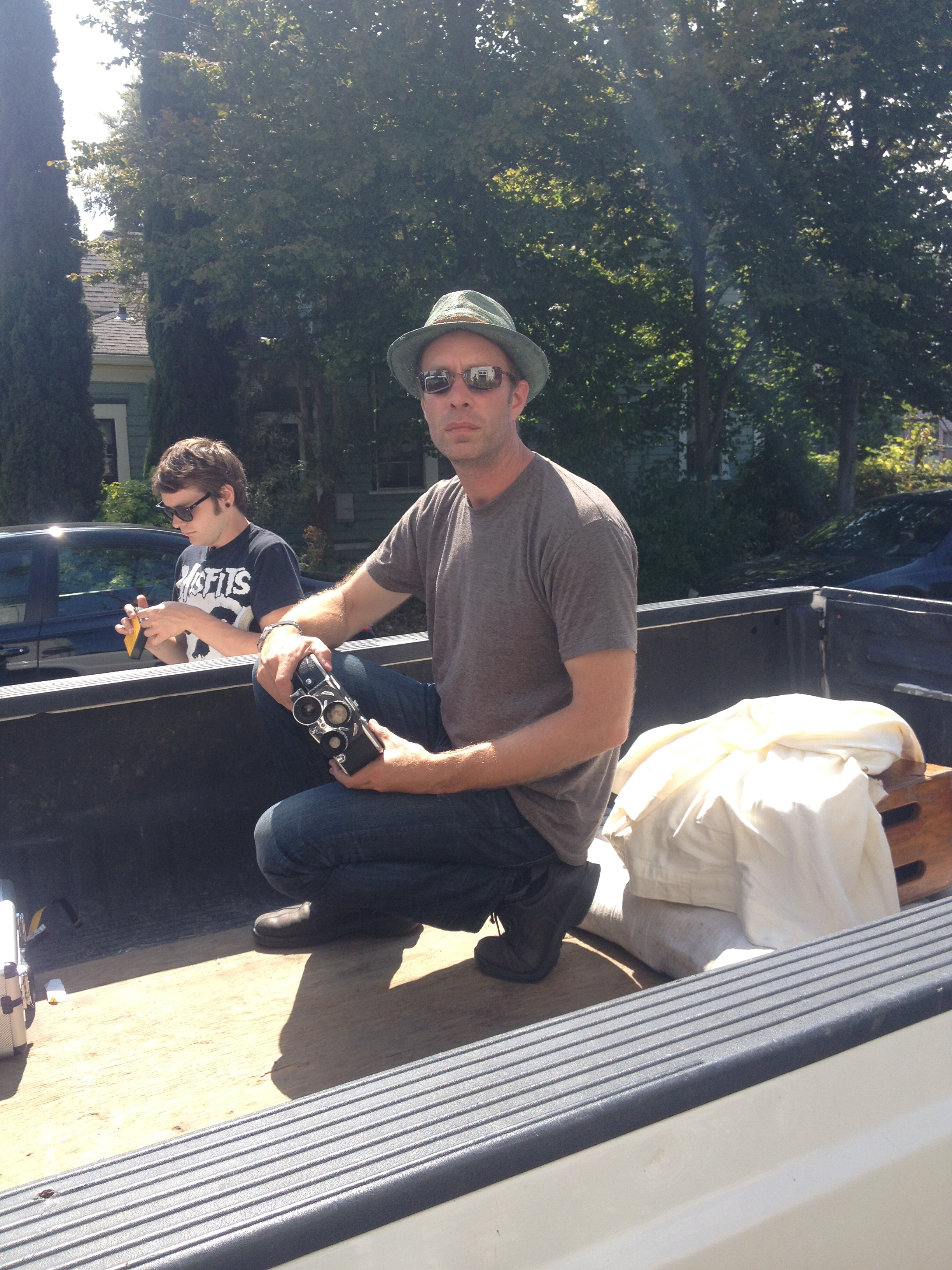If the images in his shoestring romance Beach Town seem a little grainy and washed-out, if the sun flares in the lens, if the plot and dialogue lack much heft, that’s just fine with Ballard filmmaker Erik Hammen. His third feature—and first in SIFF, where it will premiere—is more about a summertime state of mind than any kind of weighty tale. Sitting over beers at the Lock & Keel on an appropriately mild May evening, he explains how “there is a delicacy to it. It’s a beach movie of the mind. Wistfulness . . . I’m trying for that sense.”
The locations are utterly concrete: Golden Gardens, the Ship Canal, industrial Ballard, and old red-brick Georgetown. Local shops are prominently featured, as is the novel—to me, anyway—phenomenon of yoga performed on paddleboards floating just west of the Ballard locks. “Yes,” says Hammen, pleased with the same discovery, “it’s a thing.”
Yet the idyllic and idealized Beach Town—the name Seattle is never uttered or invoked—is more backward-looking, innocent, and vaguely nostalgic. Raised in a coastal Connecticut town, Hammen tells me how he sought to evoke the sensual pleasures of sand between your toes, the smell of suntan oil, the sensation of ice cream (or cold beer) on a hot summer day. “It’s an atmospheric piece,” he says of Beach Town. “It’s not literally Seattle, but the essence of it. I’m really interested in a sense of place . . . that kind of salt-burned world” of creosote-smelling boardwalks and unpolluted surf.
The plot is suitably skimpy: Sparks are struck when boy meets girl, girl has second thoughts about boy (a musician about to leave on tour), etc. The two would-be sweethearts in this chaste romance, Noelle and Arthur, are played by local stage performers Sarah Winsor and Ahren Buhmann, respectively. Not only do we see Arthur’s punk band rehearsing and performing, plus a rival synth-pop outfit, but Beach Town is scored wall-to-wall.
“About half of it I wrote,” says Hammen of the soundtrack. “I was in punk bands on the East Coast in the ’80s.” Arthur works in a record shop where a grumpy/friendly DJ (Steven Sterne) keeps tunes spinning throughout; if that makes you think of American Graffiti and Wolfman Jack, Hammen smiles at the association. He sought “a radio feeling” to the movie, the bygone sense of shared music played in the open air from boom-boxes and passing cars—not the modern private experience of earbuds and iPods.
Also lending to the vintage texture, Hammen shot entirely on 16mm film stock (later transferred to video), which is fast disappearing. (In fact, in a sad footnote, he was one of the last commercial clients for Alpha Cine Labs after completing photography on Beach Town two summers ago.) “The results you get are unbeatable,” he says of the skinny old format. “You work with the best material you can.” After being enlarged, the grainy 16mm stock yields “a tactile sense,” he notes. The medium’s limitations are integral to Beach Town’s retro charm. And like the beach towns of Hammen’s youth, 16mm may also soon be extinct—lending to that briny, wistful quality.
Even so, the friendly, bespectacled director is anything but a bitter or mournful nostalgist. “This is my third feature,” says Hammen (after 2001’s Love My Guts and Time of the Robots, a fanciful, archival sci-fi collage seen at the Grand Illusion in 2012). “This is my first one [at SIFF]; it’s very exciting.” (He and cast members will attend the festival screenings.) The former punk rocker came to Seattle 20 years ago as a Microsoft contractor. His DIY ethos drew him to indie film, using the cameras and other resources offered by Northwest Film Forum. He describes himself as “self-taught and self trained. I never went to film school.”
Why shoot primarily in Ballard? It’s what he knows. Before the first dot-com boom and bust, circa 1999, “We bought a little tiny house,” where he and his wife and two kids still live. With a day job in the tech industry, he learned his new neighborhood on foot. “This is a pedestrian film,” he jokes of Beach Town, meaning that it’s scaled and paced at a walking (and occasionally bicycling) perspective gleaned from his early shoe-leather explorations. During that time he was surprised to discover, behind the warehouses and boat sheds, that “Goddamn! Ballard has a beach!” In particular, he was drawn to the rocky-sandy Golden Gardens, appreciating the multicultural mix of barbecue parties, bird-watchers, sailboarders, and cold-weather sunbathers. “How public it is,” Hammen marvels—not exclusive Malibu, not the ritzy Hamptons, but a relaxed coastal community blending easily into industrial Ballard.
Time unfolds slowly here, as Noelle and Arthur miss connections and meet up for movie dates. Of both the plot and milieu of Beach Town, says Hammen, “There isn’t the rush” of a more conventional, more tightly plotted film. He’s seeking to recall “the experience of being kind of young and shiftless . . . but in a romantic way.” Hence there’s time to hang, time to chill, time to sing campfire songs on the beach. “I feel like the beach town is an incubator,” he says. “There’s a sense of promise. There’s still room for the eccentrics.” E
bmiller@seattleweekly.com
SIFF Cinema Uptown 511 Queen Anne Ave. N., 324-9996, siff.net. $11–$13. 6:30 p.m. Tues., June 2 & 4 p.m. Thurs., June 4.








